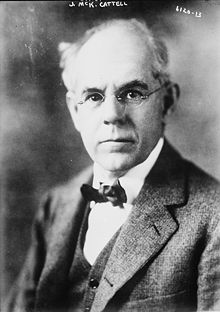
Back جايمس ماكين كاتل Arabic جايمس ماكين كاتل ARZ Ceyms Makkin Kettell Azerbaijani جیمز مککین کتل AZB Джеймс Кетъл Bulgarian James McKeen Cattell Catalan James McKeen Cattell German James McKeen Cattell Spanish James McKeen Cattell Estonian جیمز مککین کتل Persian
James McKeen Cattell | |
|---|---|
 | |
| Born | May 25, 1860 Easton, Pennsylvania, U.S. |
| Died | January 20, 1944 (aged 83) Lancaster, Pennsylvania, U.S. |
| Alma mater | Lafayette College (BA, MA) University of Leipzig (PhD) |
| Scientific career | |
| Fields | Psychology, psychometrics |
| Institutions | University of Cambridge University of Pennsylvania Columbia University |
| Doctoral advisor | Wilhelm Wundt |
| Doctoral students | Walter Dearborn Harry L. Hollingworth Shepherd Ivory Franz Edward Thorndike Edward Kellog Strong Jr. John Dashiell |
| Spouse |
Josephine Owen (m. 1888) |
| Children | 7, including Psyche |
| Father | William Cassady Cattell |
James McKeen Cattell (May 25, 1860 – January 20, 1944) was the first professor of psychology in the United States, teaching at the University of Pennsylvania in Philadelphia. He was a long-time editor and publisher of scientific journals and publications, including Science, and served on the board of trustees for Science Service, now known as Society for Science from 1921 to 1944.
At the beginning of Cattell's career, many scientists regarded psychology simply as a minor field of study, or as a pseudoscience like phrenology. Cattell helped establish psychology as a legitimate science, worthy of study at the highest levels of the academy. At the time of his death, The New York Times credited him as "the dean of American science."
Cattell was uncompromisingly opposed to American involvement in World War I.[1] His public opposition to the draft led to his dismissal from his position at Columbia University, which later led many American universities to establish academic tenure as a means of protecting unpopular beliefs.[1]
- ^ a b Jonathan Baron (2006). "History: Cattell at Penn". Retrieved 2014-09-24. Baron cites C. S. Gruber (1972), "Academic freedom at Columbia University: The case of James McKeen Cattell", AAUP Bulletin, Autumn, pp. 297-305, with respect to Cattell's views on the war and place in the debate on academic freedom.